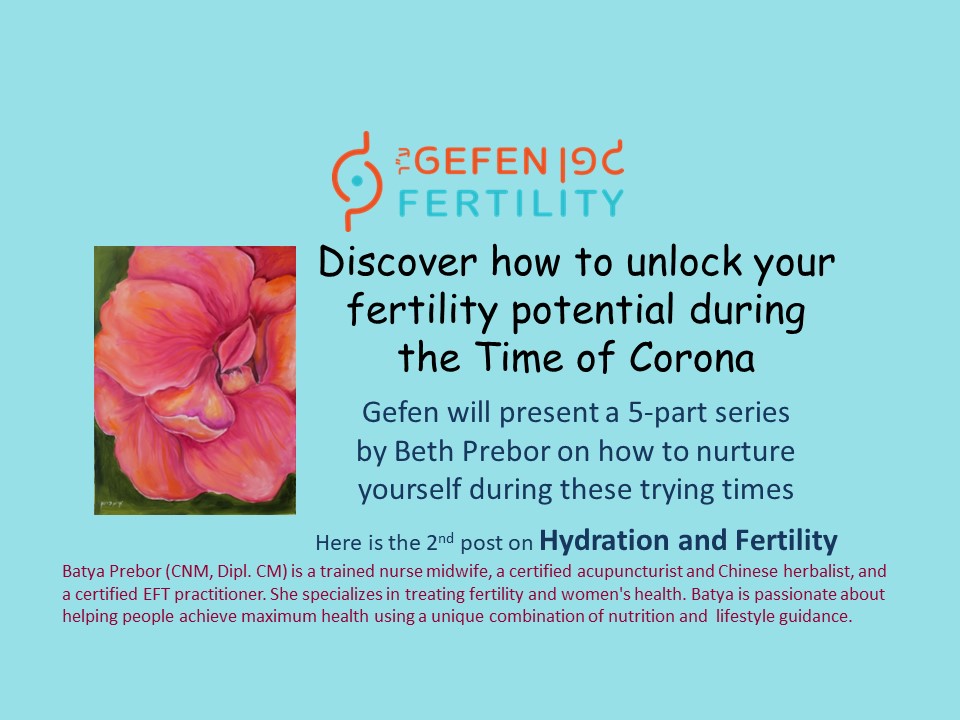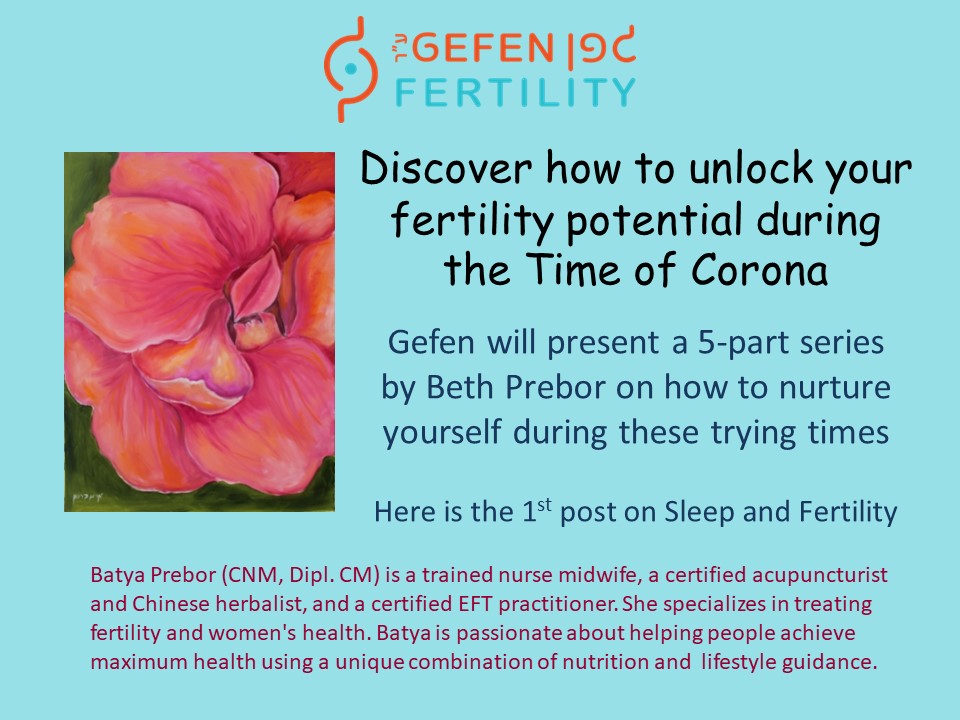- Details
- Written by: Beth Prebor

Part 2 - Hydration and Fertility
Fundamental Pillar #2: Nutrition
The second fundamental pillar of fertility is nutrition. Now I know that nutrition for fertility is a huge topic, too much to write about in a blog post. So I will give you a condensed version with easy action items that you can implement starting today.
This post will discuss hydration which for most of us is easier to do. The next post will address food so be sure to stay tuned.
Hydration
You may be wondering - why is she talking about hydration. Why is that important? How is what I drink and how much I drink related to fertility?
Water is the liquid of life, without it we would die. Up to 60% of the human body is water! Your blood is 85% water, your kidneys and muscles are 80% water, your brain and heart are around 75% water, and even your bones are watery - with 30% water.
In fact the rule of three for survival states that humans can survive for three weeks without food, three days without water, three hours without shelter and three minutes without oxygen. Our bodies, in a sense, need water more than they need food.
Yet many people are dehydrated. They either don’t drink enough water or they don’t drink it frequently enough throughout the day. Some people drink a lot but they drink the wrong drinks. For example, caffeinated drinks like coffee or soda can be dehydrating and can sabotage your water drinking efforts. The biggest signs that you’re dehydrated include inability to sweat, dry skin, bad breath, dark urine, and urination less than six times a day.
So water is important for your overall health. But how is it directly connected to fertility?
First of all, water keeps all of your organs and cells functioning properly including the reproductive cells (egg, sperm) and reproductive organs (brain, ovaries, uterus, testes, thyroid). This is extremely important for fertility. The egg is filled with fluid - and that fluid is made of water. Think about it - your eggs (and the man’s sperm) are made out of water. So to make healthy eggs you must drink water.
Secondly your body makes cervical mucus which changes throughout the menstrual month. Prior to ovulation the cervical mucus becomes very stretchy (like an egg white) and as you get closer to ovulation your body makes more of it. This stretchy mucus is supposed to help the sperm travel up towards the uterus and then to the fallopian tubes for fertilization. The more hydrated your cervical mucus is the more easily the sperm can travel through it. Studies have found that thick cervical mucus with low water content is the most difficult for sperm to penetrate. Without enough water the cervical mucus that balances vaginal pH can become too acidic and this change in pH can harm the sperm. Having little to no cervical mucus can be an indication that you’re dehydrated.
Finally, your cells need water for proper cell division and metabolism. This affects proper development of the fertilized egg into a blastocyst and its ability to implant in the uterine wall. And the cells in the uterine wall must be properly hydrated for implantation to be successful.
For men, semen production and semen volume can be reduced by not drinking enough water. If semen is thicker due to dehydration, sperm may have trouble swimming. So make sure your husband also follows the instructions below.
So how much water should you drink?
Unfortunately, using thirst as a strict guideline isn’t so reliable since people are busy throughout the day and don’t always register their body’s messages.
You can use your urine as a guide. The color should be pale yellow like lemonade. If it is a deep, dark yellow then you are probably not drinking enough water. If it is colorless, it might mean that you are drinking too much water which can cause salts & other electrolytes in your body to become too diluted. A healthy person urinates on average about 6-8 times a day. If you haven’t urinated in many hours, that’s an indication that you’re not drinking enough
A general rule of thumb for water intake is to drink 33 milliliters per kilo of weight per day. That’s roughly 2 liters per day. Remember - if it is hot out - you need to increase your water intake.
The next important factor is the timing. It is important to space the drinking out throughout the day so that your body can absorb the water slowly. If you drink it all in one shot - you run the risk of having much of the water excreted in your urine and not be absorbed into your cells and tissues. In addition - time your water intake so that you finish your allotted amount by around 7 pm so that you won’t need to wake at night to go to the bathroom.
Tips for proper hydration:
● Start your day with a large glass of water to rehydrate. You breathe out a small amount of water every time you exhale when you’re sleeping. If you sweat at night, you’re also losing water.
● Set recurring water break reminders on your phone.
● If you're not a big water drinker, here's a suggestion that some find helpful. Fill up a big cup of water every morning. Then set an alarm on your phone to go off every two hours during the day. When it beeps or buzzes, or sings (whatever you have your alarm ringtone set to), that means it's time to refill your water glass. Is that glass still full from the last time you filled it? Drink up!
Remember - if you’ve been drinking less than optimal for a long time your body has been in survival mode, not thrive and create-a-baby mode. It may take some time to slowly rehydrate.
Optimal fertility starts with the basics – water being the most critical ingredient to life. Make it a daily habit to drink enough for your reproductive needs and make sure your partner drinks too!
- Details
- Written by: Pnina Klinger
Pnina Klinger, Chinese Medicine Practitioner (Dip. Ac)
Women often ask me what supplements they can take in order to increase their chances of conceiving and support a healthy pregnancy. Below are some suggestions, however before taking any supplement, (with the exception of folic acid which is recommended for every woman trying to conceive) please speak to your doctor as to whether it is right for you.
1: Folic Acid
Folic acid is necessary to take before and during pregnancy as it can help increase your chances of becoming pregnant and can help prevent birth defects of the baby’s brain and spinal cord. Folic acid may also protect the baby from low birth weight, poor growth in the uterus and miscarriage. Before conception (at least three months before) and during the first trimester of pregnancy, 400mcg of folic acid should be taken every day. During the second and third trimesters of pregnancy 600mcg of folic acid should be taken every day. Breastfeeding mothers need 500mch of folic acid per day. In addition to taking folic acid as a supplement, here are some natural sources of folate: fortified breakfast cereal, lentils, spinach, beans, beef liver.
2: CoQ10 Enzyme
Research has found that the CoQ10 may improve fertility in both men and women. It has been recommended that men with sperm related problems take CoQ10 to improve sperm concentration, density and mobility. Today there are studies that suggest that CoQ10 could be important for female fertility as well. There are different theories as to why and how CoQ10 may improve egg quality, but what we do know is that the amount of CoQ10 naturally found in the body decreases with age and studies suggest that women with low ovarian reserve or those over 40 who are trying to get pregnant may benefit from 300-600mcg CoQ10 supplement. In pregnancy it is recommended to stop taking the supplement as its effect in pregnancy has not be studied. It is best to consult with your doctor in order to determine if CoQ10 could be helpful to you.
3: Omega 3 Fatty Acid
Omega 3 fatty acid has been proven to help fertility as it helps regulate hormones, promote ovulation and increases cervical mucus as well as the flow of blood. Our bodies cannot naturally make Omega 3 fatty acid so we must rely on gaining this nutrient either through diet or supplement. Women trying to get pregnant should take 650mcg of Omega 3 every day. Once pregnant, it is best to switch to a pregnancy Omega 3 formulation which contains higher amounts of DHA for fetal brain health. Natural sources of Omega 3 are fish oil and flax oil. It’s important to mention that Omega 3 can slow blood clotting and increase the effects of anticoagulants like coumadin so best to consult with your doctor in order to determine if Omega 3 could be helpful to you.
4: DHEA
Women with low ovarian reserve or women over 40 may benefit from taking a DHEA supplement as it may help improve the quality of the eggs. Ideally DHEA needs to be taken 16-20 weeks before IVF. Studies have found that women with low ovarian reserve (low AMH and low follicle count) often have low levels of DHEA and testosterone. By supplementing with DHEA it is possible to raise both AMH levels and follicle count thereby improve the quality and quantity of eggs retrieved. DHEA is a hormone precursor and should not be taken without talking to your doctor.

- Details
- Written by: Beth Prebor
Part 1 - Sleep and Fertility
This corona crisis has demanded patience, perseverance, and faith. Most of us have been stuck at home, unable to engage in our daily routines just waiting for this to end. For women trying to conceive this crisis has been extra frustrating with IVF clinics closed. Hopefully we are beginning to emerge, but the immediate future is still unclear.
However, as Dr. Jordana Hyman mentioned in her video message to the Gefen community, this time at home is also an opportunity; an opportunity to invest in ourselves, an opportunity to strengthen our bodies, an opportunity to perhaps maximize our fertility.
If you’re trying to conceive - the most powerful assistance you can give yourself right now is education and appropriate choices. Creating health and balance in your body leads to improved fertility. Studies show a direct correlation between targeted lifestyle choices and the chances of becoming pregnant.
In addition, successful pregnancies come from healthy eggs. When it comes to creating healthy eggs you need to understand the time factor. An egg is not nurtured only in the 14 days before ovulation. An egg undergoes a 120 day cycle of maturation and growth before it is ovulated! That means that the changes you make now will improve the eggs that will be ovulated in 3-4 months from now. Don’t wait. Start now.
I’d like to share with you the four fundamental pillars of fertility that can immediately begin to boost your fertility. I recommend these practices to all of my fertility clients. Each practice can be done at home and is entirely free.
This blog will address the first one.
Fundamental Pillar #1: Sleep
Get a good night’s sleep. Seriously. Getting enough quality sleep at the right times can help protect your mental health, physical health, quality of life, and safety. Sleep is so important and yet when push comes to shove it is often the first thing we cut when we are feeling stressed.
We all instinctively know that getting a good night’s sleep is good for our mood, our concentration, our energy levels and our performance . This may be surprising but studies show that moderate sleep deprivation can negatively impact certain aspects of our performance to a similar degree as being drunk!
But you might not know that sleep also affects many other systems in the body. Let’s take a look at a few:
Sleep is the time when our body restores and replenishes itself from the activities of the day. It allows the body to repair the heart and the blood vessels which is important for blood flow. And better blood flow in the body means that there is a chance of better blood flow to the pelvic region and to the ovaries and uterus which could improve egg quality and uterine lining.
Nighttime sleep is also vital for hormonal regulation. There are specific hormones that get secreted when we sleep. For example - our body secretes Human Growth Hormone (HGH) at night, which is obviously important for growing children and teens. But growth hormone is also important for adults, especially those who want to conceive. Growth hormone promotes production of IGF-I (insulin growth factor) which is essential during the early follicle growth stages and plays a big role in follicle development. That means that growth hormone is vital for egg development. In fact, although controversial, there are some IVF clinics that use growth hormone (HGH) to improve chances for women with low ovarian reserve. And a few clinics have tried a new tactic - supplement HGH in the six weeks before the IVF cycle and not during the actual IVF treatment. So why not encourage your body’s own Human Growth Hormone naturally and help your egg follicles by getting a good night’s sleep?
Melatonin is another hormone associated with sleep. It is connected to the way our bodies perceive light and dark and is secreted by the brain at around 9 pm to help prepare our bodies for sleep. Sometimes people with sleep disturbances or jet lag take synthetic melatonin to help regulate their sleep cycles. But here is where it gets interesting - melatonin has also been found in the fluid inside the egg. Researchers believe that it acts as an antioxidant in the egg - which means that it reduces the effects of oxidative stress and damage inside the egg. So melatonin might improve egg quality. In fact, melatonin is an experimental treatment for women with unexplained infertility! The best way to get our bodies to make melatonin is to stick to a set bedtime - preferably around 10-11 pm.
Sleep is also important for another hormone that regulates our metabolism - insulin. Insulin is what ushers the sugar from our blood and into our cells where it is used to give us energy. The problem is that sleep deprivation makes our cells less receptive to the insulin- keeping the sugar in our blood instead of moving it into the cells. This is called insulin resistance (IR) and is associated with the risk of weight gain and pre-diabetes. If this wern’t bad enough this insulin resistance (IR) is also associated with PCOS and lack of ovulation, longer time to achieving pregnancy, and higher risk of miscarriage. So sleep is important for keeping blood sugar levels steady, especially if you have PCOS. Remember - steady sugar levels are important for everyone’s fertility.
So getting some shut eye is paramount for hormonal balance that can directly influence egg quality and fertility. But there’s more. There’s a growing body of research showing that lack of sleep raises levels of inflammation in the body. Raised levels of inflammation mean that the body is in “fight or flight” mode and that the immune system is trying to fight off threats. Obviously, having a healthy immune system that can protect us from external threats is crucial. However, the inflammation becomes problematic if it is chronic. Then the immune system is in perpetual fight mode: it is constantly activating disease-fighting cells even when there is no external threat. Over time, these fighter cells can attack, wear down, and cause damage to healthy cells, tissues, organs, and systems throughout the body, leading to chronic illness like heart disease, stroke, diabetes ...and infertility.
Inflammation can affect fertility in a variety of ways. Inflammation is associated with endometriosis. Inflammation can affect ovulation and hormones levels. And, perhaps most significantly, inflammation can alter endometrial receptivity - meaning that the fertilized egg is less likely to implant in the uterine wall and develop into a healthy pregnancy.
One final important point about sleep. Both sleep and inflammation are regulated by our circadian rhythm - our body’s internal 24 hour clock that controls many of the biological processes in our body. Our circadian rhythm is controlled by our brain and is key to maintaining healthy sleep cycles. But the circadian rhythm is also linked to other processes like hormone production, including fertility hormones. Hormones like FSH and LH - which are key for follicle growth and progesterone which is vital for implantation and supporting a pregnancy are linked to circadian rhythm. That means that these hormones are pulsed based on our internal 24 hour clock. If our clock is not calibrated to the rhythm of day and night our hormone levels suffer. In fact, research shows that night shift workers have altered levels of fertility hormones.
One way to help keep circadian rhythms in sync is to maintain a consistent sleep routine. Our bio rhythms thrive on consistency. Going to bed at the same time and waking at the same time every day reinforces the healthy circadian rhythms that govern both our sleep, our immune function, and our hormonal function.
So we see how fundamental sleep is to our health and also for our fertility. It balances hormones that support egg quality and growth, makes sure our sugar metabolism is efficient which encourages ovulation and repairs our blood vessels so that circulation is improved in the whole body and specifically to the ovaries and uterus. Reduced sleep can lead to inflammation which can interfere with implantation.
It is not surprising then that when IVF outcomes of 670 women were studied and broken down according to sleep habits researchers discovered that moderate sleepers - women who slept 7-8 hours per night had significantly more pregnancies than short (4-6 hours) sleepers.
How much sleep do I need? Aim for 7-8 hours of sleep per night.
How to get a good night’s sleep:
- Aim for a set bedtime and wake up time every day
- Don’t ingest caffeine after 2 pm
- Don’t drink alcohol or eat within 3 hours of bedtime
- Exercise in the morning; don’t exercise within 4 hours of bedtime
- Get sun exposure during the day; best in the morning
- Create a relaxing bedtime routine which includes powering down electronics. In fact it's best if you can leave the devices outside the bedroom or put them in airplane mode
The bottom line is - getting 7-8 hours of sleep per night, at night, is crucial for your fertility. Pleasant dreams!
- Details
- Written by: Keren Gefen




